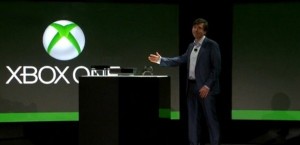Xbox One policy change was the only option
Yesterday Microsoft backtracked on its vision for the future. Since the Xbox One reveal we've been told about an online, connected gaming world, where we'd have to do strange things like 'check in' every day or jump through hoops just to share a game with a friend. Apparently this was the way gaming was going, and it would actually benefit players in the long-term, or so Microsoft said. But judging from the hate-fueled ranting over the last few weeks, maybe we just aren't ready for an always-online future yet.
Not when your product is going up against the kind of console that Sony is offering, anyway. The PlayStation 4 has been lauded as the people's choice, the gamer's machine. You buy or download a game and you play it. There's no need to have an internet connection, and any rules regarding used games are set by the publishers, Sony is staying well clear. Compare that to Microsoft's stance and all the marketing speak about everything being better when they can check up on what you're doing - it's a no contest.

Now the Xbox One falls in line with what the Xbox 360 offers. You never have to connect online if you don't want to. You don't have to register your games online, and they're not tied to a single account anymore, you can lend or sell them as you wish. In addition, region-locking has been lifted, so you can buy an Xbox One from anywhere and it should work in any country.
Unfortunately we lose a few of the more interesting features as well. Being able to share games with ten "family" members anywhere in the world is no longer a possibility. And as games are no longer tied to accounts, you'll have to bring the physical discs with you if you want to play games on a different Xbox One. But this seems like a small price to pay for a better gaming ecosystem.

In the short term this is really the only option that Microsoft had. Could Don Mattrick and the rest of the Xbox One thinkers afford to stick to their guns and push through with their plans in the face of such adversity? Maybe. The vocal, hardcore gamers mostly despised it, but the casual gamer - the silent majority - probably didn't even know anything of the DRM plans. They would have just handed over money for anything with 'Xbox' written on the front.
But it was the company's reputation that was taking a battering. It was being portrayed as the bad guy, the bully, the big corporation that was only in it for the money and not for the love of gaming. That might still be the case, but I bet there'll be a few more pre-orders coming in for the Xbox One in the run up to launch.




